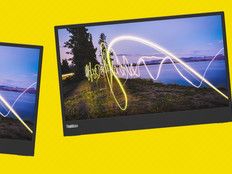AR Joins VR to Spark the Next Generation of Tourism
Ever been underwhelmed by a vacation? Unfortunately, it's not like you can "try it before you buy it" or do much to kick it up a notch once you get there, right?
Well, what if you could?
State and local tourism boards have been adopting virtual and augmented realities to deepen the sightseeing experience for tourists and showcase locations for prospective travelers.
SIGN UP: Get more news from the StateTech newsletter in your inbox every two weeks
Virtual Reality Takes Tourism to the Next Level
Anyone who watched the Olympics in PyeongChang, South Korea could join the action via Intel's virtual reality experience, True VR. But jetting off to a place via VR isn't just something that you can experience once every four years. In fact, many state and local governments are putting the tech to work to showcase possible tourist sites.
The Louisiana Office of Tourism, for example, is capitalizing on the technology to show potential visitors the state's beauty from the comfort of their own homes through five one-minute VR videos.
"We can show you pictures of Louisiana, but we really weren't able to convey that experience [of being there] exactly. We weren't able to put you in that airboat, seeing the alligators. We weren't able to take you to the No. 1 bass fishing lake to catch a bunker," Barry Landry, director of communications for the Louisiana Office of Tourism, tells StateTech about tourism before VR. Now, the state can get tourists one step closer to the action via VR.
In Mississippi, as part of a high-tech website upgrade, tourists and curious citizens can access a VR tour of the state capitol building. The tour provides in-depth information on six areas of the historical site.
"Citizens' expectations of digital platforms continue to evolve," said Craig Orgeron, executive director of the Mississippi Department of Information Technology Services, in a press release. "Mississippi has responded to those growing needs by thinking outside the browser and bringing successful private sector technologies to government — technologies like machine learning and virtual reality."
Smart Glasses, Phones Introduce AR to Travel Destinations
The Pokemon Go craze might be over, but augmented reality is just getting a start when it comes to making our streets more interesting. With the help of smartphones and smart glasses, such as Google Glass and Intel's trendy new Vaunt wearables, the tourism industry is getting a boost.
Florida is targeting AR technology to draw more tourists to the state's many attractions, including theme parks.
Meanwhile, earlier this year, AR tours were introduced at major historic sites in Virginia, including George Washington's Mount Vernon and James Monroe's Highland, which is partially maintained by the Charlottesville Albemarle Convention and Visitors Bureau. These experiences are enabled through ARtGlass, which collaborates with cultural sites to create AR experiences, on Epson's Moverio smart glasses.
"U.S. museums and cultural sites attract more visits annually than pro sporting events and theme parks combined," ARtGlass CEO Greg Werkheiser said in a press release. AR can offer a groundbreaking way to enrich these experiences and widen the audience by offering 3D reconstructions, animated characters, pictures, text and even enable conversations between historic characters.
"AR brings historical figures to life and shares the sense of discovery here at Highland in ways that are both educational and entertaining," James Monroe's Highland Executive Director Sara Bon-Harper said in the press release. "We expect to draw more — and more diverse — visitors."









